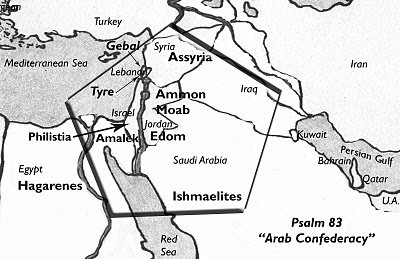Why Iran’s Absent From Psalm 83 – Part One
on Saturday, February 18, 2012 by Bill SalusThis article was taken from a portion of the biblical commentary of the same name in my book called Revelation Road.
As the Psalm 83 confederates image depicts, Syrians and Iraqis find association through Assyria, Hezbollah via Tyre in Lebanon, and Hamas hailing from Gaza connects with Philistia. However, there is no mention of Iranians by their three primary historical names, Elamites, Medes, or Persians. This is puzzling, considering Iran reportedly formed bona fide war-pacts in December, 2009, with Syria, Hezbollah, and Hamas.
 Because Iran is presently providing weapons to Syria, Hezbollah, and Hamas, some suggest Iran may be included in Psalm 83 as part of the Assyrians. The Assyrians seem to be among the stronger members in the psalm, because they support the Jordanian army referred to as the children of Lot (Moab and Ammon) in Psalm 83:8.
Because Iran is presently providing weapons to Syria, Hezbollah, and Hamas, some suggest Iran may be included in Psalm 83 as part of the Assyrians. The Assyrians seem to be among the stronger members in the psalm, because they support the Jordanian army referred to as the children of Lot (Moab and Ammon) in Psalm 83:8.
Assyria also has joined with them; they have helped the children of Lot [Jordanians]. Selah (Psalm 83:8)
The pitfall of connecting modern-day Iran with Assyria is that during the psalmist’s time, Assyria only comprised much of what is today northern Syria and part of Iraq.
In order for Iran to be mentioned in Psalm 83, the psalmist would need to have included, Elam, Media, or Persia in the confederate lineup. At the time the Psalm was written about 3,000 years ago, Elam existed in what is now west-central Iran, Media existed in eastern Iran and far beyond, and Persia occupied primarily the northerly parts of today’s Iran. Thus, it is reasonably safe to exclude Iranians, which are primarily of Persian descent, from the predominately Arab confederacy of Psalm 83.
IRAN IS PERSIAN AND PSALM 83 IS ARAB
The Persian verses Arab distinction made in the previous sentence may be part of the reason Iran doesn’t participate alongside their Arab proxies in Psalm 83. The confederacy is dominated by Arab populations. Arabs and Persians have a longstanding history of warring against each other, dating as far back as the Persian conquest of the Babylonians around 539 BC. In modern history, Iraq and Iran fought against each other from 1980-1988.
Saudis, as the Ishmaelites, and Egyptians, as the Hagarenes, are members of Psalm 83 and they may feel threatened by any Iranian meddling in the Arab- Israeli war. Presently, both of these Arab countries are deeply concerned about Iran’s nuclear aspirations, and fear Iran’s greater goal is to subdue their respective nations in order to form a Shiite Crescent throughout the Middle East. Egypt and Saudi Arabia are primarily comprised of Sunni Muslims.
The Arab verses Persian argument is not the only possible reason Iran refrains from participating in the Psalm 83 War. Possibility number two is that part of Iran may be temporarily incapacitated at the time, according to a generally overlooked prophecy issued by Jeremiah.
In part two, we will look at the dual end time’s prophecies of Iran. Iran appears to experience a double jeopardy in the last days, but most scholars are fixated only on Iran’s role as Persia in Ezekiel’s prophecy regarded with the Gog of Magog invasion. At the time Ezekiel included Persia in the Magog coalition, it only covered a portion of modern day Iran; Elam and Media covered the rest.
Ezekiel appears to have purposely omitted Elam from Gog’s nine-member consortia; but why? It could be that the prophecies concerning Elam in Jeremiah 49:34-39 may hold the answer to this mystery. Find out more in part two called “The Dual End – Time Prophecies of Iran.”
Pick up your copy of Revelation Road here.


